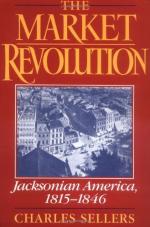|
This section contains 430 words (approx. 2 pages at 400 words per page) |

|
Chapter 2, Ambiguous Republicanism Summary and Analysis
Sellers argues that Jefferson comes to power through an anti-commercial, anti-capitalist groundswell by land owners and commercial groups that are being destroyed by the market revolution. When Jefferson comes to power, however, his natural pro-land, pro-farmer politics are tempered by the influence of James Madison, a more traditionally educated and more market-oriented man who, while agreeing with Jefferson on many policies, such as free trade, is an ardent market liberal. In this way the Republicanism of both men is "ambiguous" because it is torn between a capitalist strand and an anti-capitalist strand. The Madisonian capitalist strand emphasizes free-markets and strong property rights, whereas the Jeffersonian anti-capitalist strand emphasizes an equal distribution of wealth, a suspicion of concentrations of capital and democratic institutions. For a time in American history it looks as if these two strands are compatible...
(read more from the Chapter 2, Ambiguous Republicanism Summary)
|
This section contains 430 words (approx. 2 pages at 400 words per page) |

|




